Pauling Fellowship Alumni
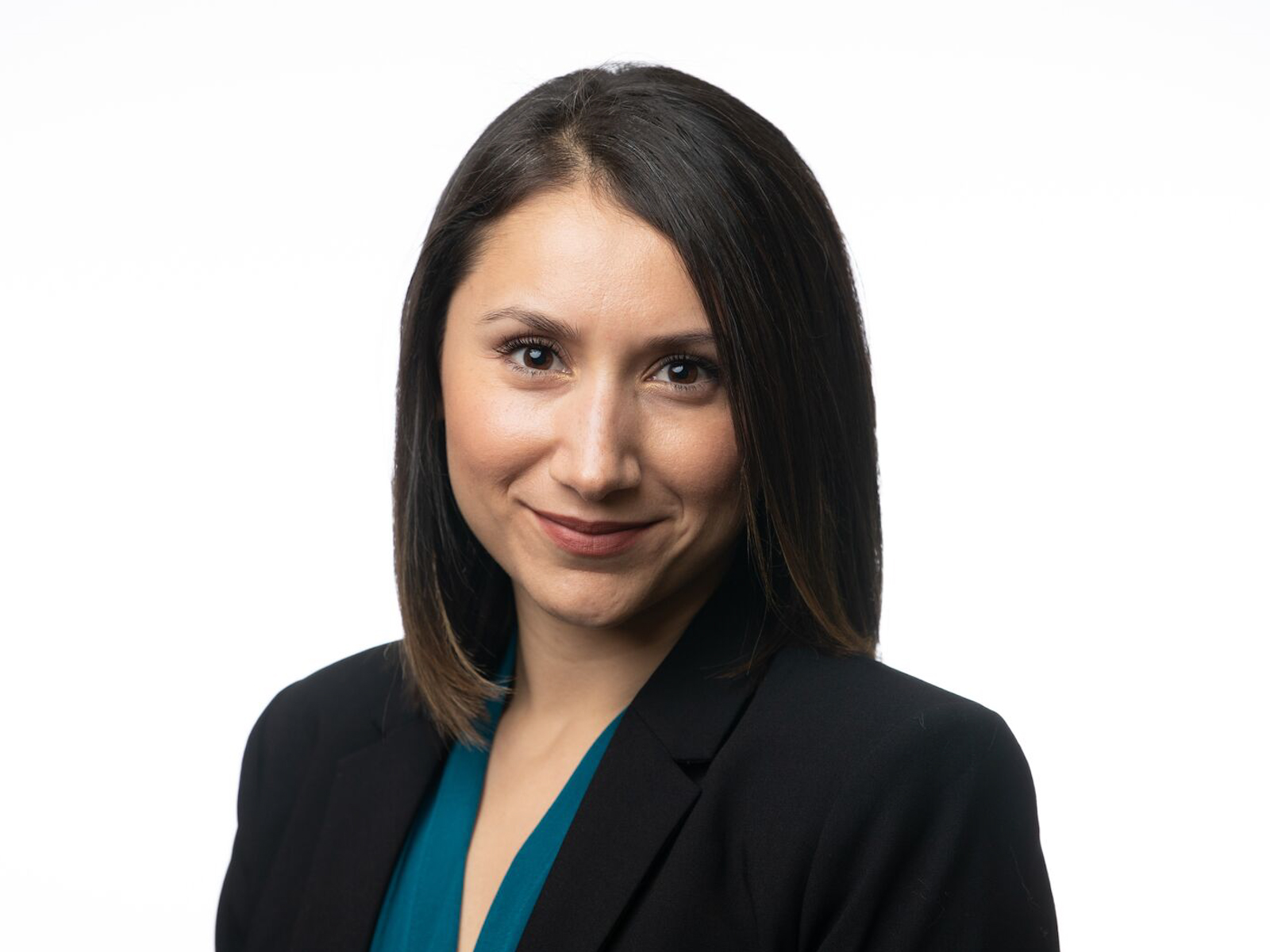 | Ana Arteaga - 2021 Pauling Fellow Ana received her PhD from Oregon State University under the mentorship of Dr. May Nyman. Ana’s dissertation work focused on studying the formation of uranyl peroxide clusters in solution and the solid state using a wide range of X-ray and spectroscopic techniques. Ana is currently a member of the Nuclear & Radiochemistry team in the Global Nuclear Science and Technology group in the National Security Directorate. She is mentored by Robert Gian Surbella. Her current research focuses on leveraging well-defined trivalent actinide (Pu, Am, Cm) oxide nanocluster chemistry to delineate periodic trends in the electronic and coordination environments, physical and chemical properties in solution, and the solid state to address the need to advance fundamental transuranic chemistry. |
 | Jeremy Gaison - 2021 Pauling Fellow Jeremy earned his PhD in physics from Yale University. He conducted research at Wright Laboratory under his advisor, Karsten Heeger, and he was supported by a National Science Foundation Graduate Research Fellowship. His work focused on developing and implementing novel detection techniques for neutrinos produced in nuclear reactors. Jeremy also has a BS in physics and mathematics from Drexel University. Jeremy is continuing his work developing new detector technologies as part of the Fundamental Physics group at PNNL under the guidance of Brent Vandevender. By characterizing radio frequency signals of electrons undergoing cyclotron motion in a magnetic field, Jeremy aims to measure the mass scale of neutrinos. This measurement will have broader implications for cosmology and pave the way for other precision measurements of nuclear processes. |
 | Bram Stone - 2021 Pauling Fellow Bram earned his PhD in biology from the University of Mississippi, where he studied the ecological patterns of bacterial communities on plant leaves under Colin Jackson. Following his doctoral research, he worked as a postdoctoral scholar with Bruce Hungate at the Center for Ecosystems Science and Society at Northern Arizona University. There, he used stable isotope probing to explore the activity and growth of individual bacterial populations within their natural soil environment. At PNNL, Bram is working on the Microbiome Science Team with Kirsten Hofmockel. His work will measure the distribution of key traits related to carbon use efficiency across the bacterial tree of life. His work continues to develop the potential for stable isotopes, particularly heavy oxygen, to quantify the complex expression of bacterial traits in natural settings. He plans to utilize the cutting-edge technologies at PNNL to link microbial activity with soil carbon formation and decomposition. |
 | Andy Lin - 2020 Pauling Fellow Andy earned his PhD from the Department of Genome Sciences at the University of Washington. His doctoral research, under Bill Noble, focused on developing computational methods for analyzing liquid chromatography-tandem mass spectrometry-based proteomics data. Prior to his PhD, he received his BS in bioinformatics and cell molecular biology from the University of Michigan. Andy joined PNNL as a Linus Pauling Fellow in 2021 and converted to staff in the Chemical and Biological Signatures group in 2024. His research focuses on the development of computational tools for the analysis of mass spectrometry-based proteomics and metabolomics data for bioforensic analysis. More recently he has conducted work into the development of bioagent agnostic signatures for biodefense as well as research into understanding the risks posed by AI/ML models such as large language models. |
 | Neerja Zambare - 2020 Pauling Fellow Neerja earned her PhD in chemical engineering from Montana State University, conducting research in the Bioprocess Laboratory at the Center for Biofilm Engineering. Under the mentorship of Robin Gerlach and Ellen Lauchnor, her graduate work focused on reactive transport during microbially induced calcium carbonate precipitation (MICP) and the applications of MICP in environmental remediation such as well-fracture sealing by biomineralization and heavy metal contaminant sequestration by co-precipitation. Her work also explored biomineralization at the single-cell level using droplet-based microfluidics paired with optical and chemical imaging techniques. At PNNL, Neerja expanded on her microscale biomineralization work in the Environmental Molecular Sciences Laboratory under the guidance of Alice Dohnalkova. Neerja studied the underlying cellular-level and biofilm-level processes that support biomineralization through correlative microscopic and microanalytic techniques. She was interested in determining the function of microbes during nucleation of biological precipitates and in developing engineered microenvironments using organics to control the precipitation process. She is now the senior engineer in research and development at Lonza. |
 | Darian Smercina - 2020 Pauling Fellow Darian earned her PhD in crop and soil sciences from Michigan State University under the mentorship of Lisa Tiemann. Her doctoral research focused on understanding the complex biological and environmental controls on free-living nitrogen fixation in soil systems, a vital biogeochemical process. Darian also has a BS in biology from the University of Toledo. Under the mentorship of Kirsten Hofmockel, Darian = joined the microbiome science team in the Earth and Biological Sciences Directorate. She pursued soil microbial ecology and biogeochemistry-relevant questions, using novel microfluidic systems and biological nitrogen fixation as a model process to address questions about microbial-scale processes and microbial interactions. Her work contributed broadly to our understanding of environmental microbiology and aims to improve our predictive capacity of soil microbial communities as they relate to global biogeochemical cycles. She is now a senior scientist at Kula Bio. |
 | Jayde Aufrecht - 2019 Pauling Fellow Jayde earned her PhD from the University of Tennessee's Bredesen Center for Interdisciplinary Research and Graduate Education, supported by a National Science Foundation Graduate Research Fellowship. She conducted her doctoral research at Oak Ridge National Laboratory under the mentorship of Scott Retterer. This work focused on using microfabrication processes to create synthetic habitats for plants and microorganisms to enable dynamic imaging of rhizosphere interactions. In the Environmental Molecular Sciences Division under the mentorship of Jim Moran, Jayde continued to build synthetic micro-habitats and uses a systems biology approach to understand microbial interactions in the soil. She worked with chemical imaging experts at the Environmental Molecular Sciences Laboratory to develop a platform for dynamic spatial sampling of metabolite exchanges between organisms. Her research contributed to our knowledge of terrestrial carbon cycling and could lead to improved sustainable agriculture methods. She is currently a biologist with PNNL. |
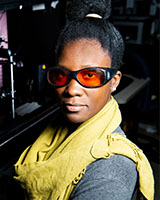 | Mavis Boamah received her PhD in chemistry from Northwestern University under the mentorship of Professor Franz M. Geiger after obtaining a BA degree from Wellesley College with majors in chemistry and mathematics. Her graduate school research focused on understanding reactions occurring at the charged mineral oxide/water interface using nonlinear optics, improving environmental remediation techniques, investigating the nanostructure of metallic films with atom probe tomography, and employing nanodevices to generate renewable energy. She is a member of the Geochemistry group in the Physical and Computational Sciences Directorate. Here, Mavis is developing a molecularly resolved structural model of an electrical double layer at a ubiquitous and essential metal oxide/aqueous solution interface to improve fundamental understanding of how this structure controls interfacial electron transfer processes that lie at the heart of many environmental chemistry challenges and new energy device problems. She aims to overcome knowledge-limiting obstacles by capitalizing on her unique experience and PNNL's world-class capabilities in nonlinear optical spectroscopies and supporting theory and computation tools. She is currently a chemist with PNNL. |
 | Sam Silva – 2019 Pauling Fellow Sam worked in the Atmospheric Sciences and Global Change Division with Susannah Burrows applying data science and artificial intelligence tools to research in atmospheric chemistry and composition. He is particularly interested in using these tools to improve the representation of processes relevant to atmospheric composition in Earth system models. Sam is currently on the faculty of the Department of Earth Sciences at the University of Southern California. |
 | Sten Lambeets – 2018 Pauling Fellow Sten is now a materials scientist at PNNL. He is pushing the limits of atom probe microcopy (APM) to study surface phenomena in the presence of a very high electric field and the development of the in operando APM dedicated to mapping surface reactions in real-time at the molecular scale. |
 | Matt Kaufman – 2018 Pauling Fellow Matt is now a faculty member of Worcester State University. He previously was an earth scientist at PNNL. He focused on microbially-mediated river corridor redox systems, including designing and building field- and laboratory-based optical dissolved gas sensor systems. He has extensive experience coordinating, leading, and participating in a wide array of field campaigns and building multidisciplinary research teams using an integrated computational simulation, experimentation, and observational approach. |
 | Ismael Rodríguez Pérez – 2018 Pauling Fellow While he was at PNNL, he was a former member of the Stationary Energy Storage team within the Battery Materials and Systems group in the Energy and Environment Directorate working in research for grid-level applications. He focused specifically toward dual-ion batteries (DIBs), water-in-(bi)salt electrolytes, and Gel electrolytes, where he looked into using low-cost, renewable, and scalable materials for high-voltage aqueous batteries. Ismael engages in optimizing electrolytes to discover the potential of aqueous DIBs. He later took a position with silanano in the battery industry. He is currently with Blue Current. |
 | Gian Surbella – 2017 Pauling Fellow Gian is now a chemist working in nuclear and radiochemistry at PNNL. |
 | Elias Nakouzi – 2017 Pauling Fellow Elias is now a materials scientist at PNNL. Every day is the best day of his life. |
 | Hansi Singh – 2016 Pauling Fellow In the Earth and Biological Sciences Directorate, with the mentorship of Phil Rasch and Ruby Leung in the Atmospheric Sciences and Global Change Division, Hansi focused on understanding how high-latitude climates respond to system perturbations. Her emphasis was on coupled atmosphere–ocean–ice dynamics in the polar regions and the role of meridional energy transports. |
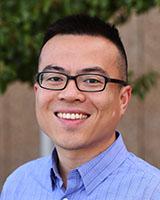 | Bo Peng – 2016 Pauling Fellow At PNNL, he joined the Environmental Molecular Sciences Laboratory as part of the Molecular Science Computing performance software group. For his fellowship, Bo worked with Karol Kowalski to develop efficient wave-function-based computational schemes for accurately computing ground and excited state wave functions of large systems. This will bring the routine application and accuracy of high-level quantum calculations into many regimes that previously could only be accessed by low-level calculations. |
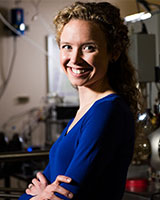 | Kelsey Stoerzinger – 2016 Pauling Fellow Kelsey is now a member of the faculty of the Department of Chemical, Biological, and Environmental Engineering at Oregon State University. |
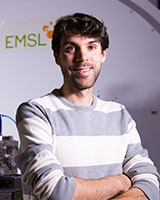 | Rene Boiteau – 2016 Pauling Fellow Rene is now a member of the faculty of the College of Earth, Ocean, and Atmospheric Sciences at Oregon State University. |
 | Garrett Goh – 2015 Pauling Fellow Garrett is now a Machine Learning Applied Science Engineering Manager at Microsoft, Xbox. |
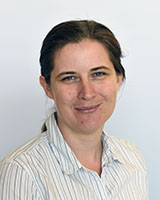 | Kathe Todd-Brown – 2015 Pauling Fellow Kathe is now a faculty member in the Department of Environmental Engineering Sciences at the University of Florida. |
 | Luis Estevez – 2014 Pauling Fellow He is currently working at the University of Dayton Research Institute while he attempts to transition his technology from the lab into the commercial space. To that effort he has founded his company, Advanced & Innovative Multifunctional Materials (AIMM), LLC. |
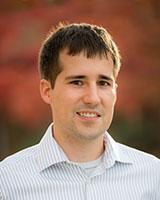 | Jeff Katalenich – 2014 Pauling Fellow Jeff Katalenich is a staff research scientist and engineer at PNNL. His interests and experiences are broad but focus primarily on national security, material processing, and space nuclear power. In 2021, Jeff received PNNL’s Ronald Brodzinski Award for Early Career Exceptional Achievement based on his sol-gel research. |
 | Hans Bernstein – 2013 Pauling Fellow In the National Security Directorate, Hans worked under the mentorship of Helen Kreuzer on a project that aimed to identify controllable, cooperative ecological phenomena employed by phototrophically driven microbial communities for conceptualizing and engineering multispecies biocatalytic platforms. |
 | Ryan Comes – 2013 Pauling Fellow At PNNL, his research focused on epitaxial oxide films grown via oxide molecular beam epitaxy under the mentorship of Scott Chambers in the Physical and Computational Sciences Directorate and the Environmental Molecular Sciences Laboratory. |
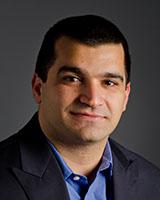 | Patrick El Khoury – 2013 Pauling Fellow Currently, Patrick is a senior research scientist in the Chemical Physics and Analysis group, within the Physical Sciences Division at PNNL. Among other things, he spends his days worrying about molecules, plasmons, and their interactions as gauged through tip-enhanced Raman nanospectroscopy and nanoimaging. |
 | Ryan Renslow – 2012 Pauling Fellow At PNNL, his research focused on the identification of novel metabolites in complex samples, the relationship between microbial community structure and function, and the emergence of higher order properties in multispecies communities. To achieve this, he used a suite of computational and mathematical tools, as well as advanced imaging techniques. Applications of his work intersected human health, energy production, ecology, national defense, machine vision, and biotechnology research areas. |
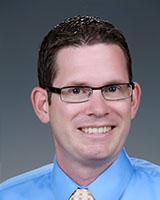 | Brian Miller – 2012 Pauling Fellow While at PNNL, Brian's research areas focused on the continued development of high-spatial-resolution ionizing radiation detectors. In particular, he is investigating gas electron multipliers and their potential for neutron detection and imaging applications. |
 | Priyanka Bhattacharya – 2012 Pauling Fellow Priyanka worked with Jiguang (Jason) Zhang and Dr. Daniel Gaspar in the Applied Materials Sciences Division within the Energy and Environment Directorate. Her research focused on improving the performance of Li-air and Li-S batteries by developing a fundamental understanding of the electrochemistry of battery materials that affect battery realization at the commercial scale. To achieve this goal, Priyanka developed new hybrid electrode materials consisting of both soft and condensed nanomaterials that can efficiently increase the capacity and improve the cycling capability of batteries beyond Li-ion. The ultimate goal of her research was to tackle the fundamental operational challenges that are hindering the growth and commercialization of energy storage devices for high-energy-density applications. After working as a battery engineer at Tesla, Priyanka moved to Blue Current, Inc. as a senior manager for Battery R&D. |
 | James Stegen – 2011 Pauling Fellow This data will be used to develop process-based simulation models for predicting the effects of remediation strategies and environmental change on key ecosystem functions, such as subsurface contaminant transport. James was awarded a 2019 DOE Early Career Award. |
 | Andreas Vasdekis – 2011 Pauling Fellow His research interests generally lie at the interface of photonics, biophysics, and materials. At PNNL, as a member of the Environmental Molecular Sciences Laboratory, he investigated processes and interactions associated with biofuel synthesis by developing and applying precision biological measurement techniques in microfluidics. |
 | Hui Wan – 2011 Pauling Fellow Hui's research focuses on understanding process interactions in the atmosphere and decreasing the uncertainty associated with component coupling in the global climate. |
 | Susan Wiedner – 2010 Pauling Fellow Susan's research focus is on developing and integrating a subcellular chemical proteomics platform using activity-based probes and subcellular fractionation to facilitate the analysis of enzyme activity to promote the field of proteomics. This technology could lead to a better understanding of systems biology on the cellular level. |
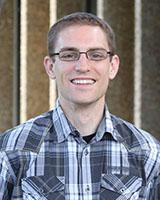 | Marcel Baer – 2010 Pauling Fellow |
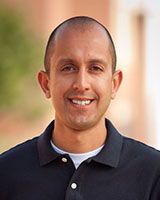 | Grant Johnson – 2009 Pauling Fellow Grant is developing unique capabilities for the controlled preparation and characterization of alloy nanoparticles (NPs) and clusters of precise composition. His research is employing oxygen reduction as a model reaction to investigate how the size, shape, elemental composition, and support interaction of alloy NPs and clusters on surfaces influence their catalytic behavior. Utilizing these capabilities and fundamental insights into structure–reactivity relationships will allow the directed design of improved alloy NPs and clusters for a broad range of applications in catalysis and energy storage. |
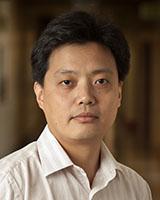 | Xiao Lin – 2009 Pauling Fellow |